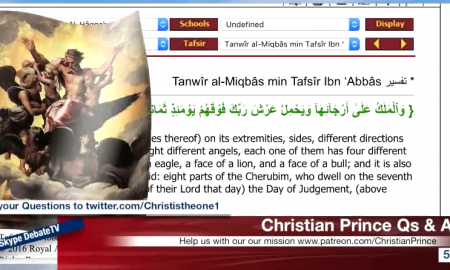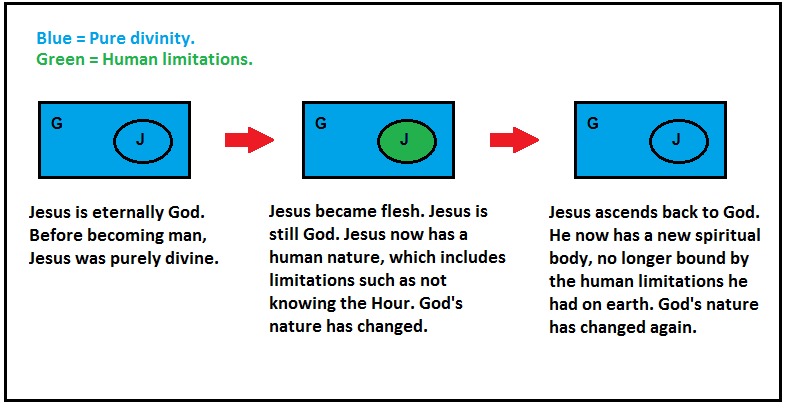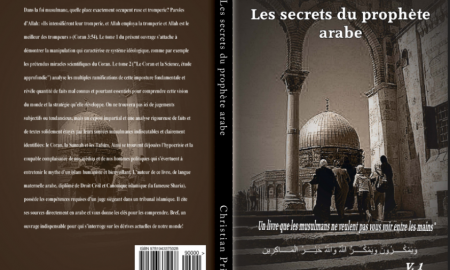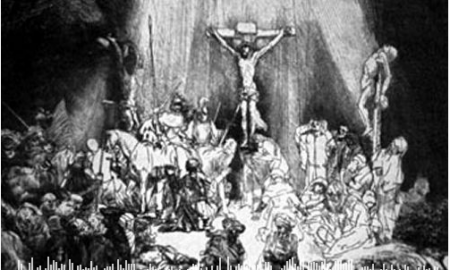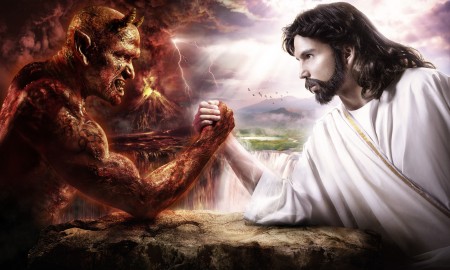below is the Muslims claim and the video expose IT ALL
2. Jesus is not God.
There are some ambiguous parts of the New Testament which are interpreted by Trinitarians to mean that Jesus is God:
The Son is the image of the invisible God, the firstborn over all creation. For in him all things were created: things in heaven and on earth, visible and invisible, whether thrones or powers or rulers or authorities; all things have been created through him and for him. He is before all things, and in him all things hold together. And he is the head of the body, the church; he is the beginning and the firstborn from among the dead, so that in everything he might have the supremacy. For God was pleased to have all his fullness dwell in him. [Colossians 1:15-19]
When we examine the Bible holistically, we find that the attributes and personality of Jesus and God are so juxtaposed that they cannot be the same God. This is because Jesus lacks many of the attributes of God such as Omniscience and Omnipotence.
The common way that Trinitarians attempt to resolve this paradox is to say that when God took on flesh in the form of Jesus on earth, He had a human nature alongside a divine nature. So the person of Jesus had two natures such that he was both fully man and fully God at the same time. Therefore in becoming man, God was subject to the limitations of human beings because of the human nature of Jesus. Once Jesus was crucified, resurrected and ascended back to God, he took on a new glorified, spiritual body. Now that he has taken up his place on the throne at the right hand of God, he is free of all the limitations he had when he was here on earth.
Now there is a real problem with this explanation. The Bible explicitly states that God Almighty has an eternal and unchanging nature:
Your throne is established from of old; you are from everlasting. [Psalm 93:2]
I the Lord do not change. So you, the descendants of Jacob, are not destroyed. [Malachi 3:6]
So as you can see, this explanation creates more problems than it attempts to solve. You can’t have an eternal and unchanging God on the one hand, and a ‘person’ of Him, Jesus according to Christians, that is changing. If Jesus took on a dual nature, that is, a limited human nature alongside his divine nature, whilst at the same time still being God, then the implication is that in becoming man, the nature of God changed. When Jesus then ascended and took on a glorified, spiritual body, whilst still being God, then the nature of God changed once again. This conflicts with the knowledge from the Bible that God is eternal and unchanging. Here is a diagram which summarises the Christian claims and why they are a problem (click on picture to enlarge):
The Qur’an resolves these paradoxes and theological problems by portraying Jesus in the correct light:
They have certainly disbelieved who say, ”Allah is the Messiah, the son of Mary” while the Messiah has said, “O Children of Israel, worship Allah, my Lord and your Lord.” Indeed, he who associates others with Allah – Allah has forbidden him Paradise, and his refuge is the Fire. And there are not for the wrongdoers any helpers. [Chapter 5, verse 72]
3. Jesus was not crucified.
All the writers of the New Testament unanimously state that Jesus was crucified. The Qur’an claims the exact opposite, Jesus was not crucified but rather God saved him from this grisly fate:
And [for] their saying, “Indeed, we have killed the Messiah, Jesus, the son of Mary, the messenger of Allah.” And they did not kill him, nor did they crucify him; but [another] was made to resemble him to them. And indeed, those who differ over it are in doubt about it. They have no knowledge of it except the following of assumption. And they did not kill him, for certain. [Chapter 4, verse 157]
The Qur’an states that those who believe that Jesus was crucified “differ about it” and are “in doubt”. In other words, the claims of the New Testament about these events surrounding Jesus are not reliable. It would be truly remarkable if the Qur’an’s claims about the reliability of the New Testament were proved to be correct, when not only is the Qur’an in direct opposition to multiple eyewitnesses of the Crucifixion (as the New Testament claims), but the Qur’an was also revealed much later than the New Testament.
Since the Crucifixion and Resurrection are the bedrock of the Christian faith, one would expect the information presented about these events in the New Testament to be in perfect harmony. When one analyses the various New Testament accounts of the Crucifixion and Resurrection of Jesus, we find that they are filled with irreconcilable contradictions and inconsistencies. One very famous issue is known as the “Mary Magdalene Problem”,
If the writers of the New Testament can’t even get the details of this significant event right, then it casts doubt on their credibility as inspired writers, and therefore the reliability of the New Testament as a whole. Why should anything that they recorded about Jesus be accepted as a reliable account? Mankind should rely on the Qur’an as an accurate and reliable source of information about the life and teachings of Jesus, peace be upon him, because the Qur’an is free of contradictions.

